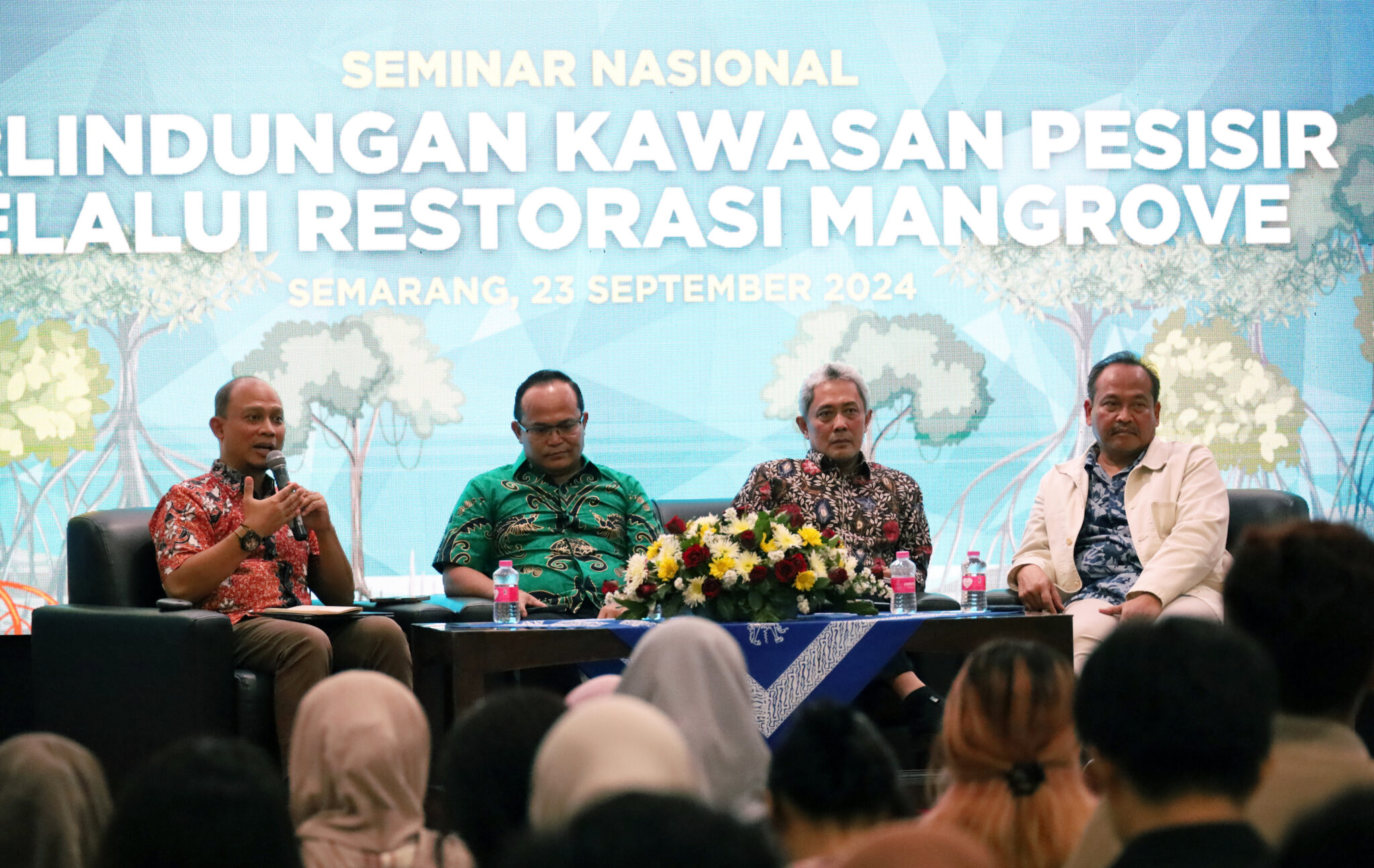[et_pb_section fb_built=”1″ admin_label=”section” _builder_version=”4.16″ custom_padding=”10px||0px||false|false” locked=”off” collapsed=”off” global_colors_info=”{}” theme_builder_area=”post_content”][et_pb_row admin_label=”row” _builder_version=”4.16″ background_size=”initial” background_position=”top_left” background_repeat=”repeat” custom_padding=”||0px||false|false” global_colors_info=”{}” theme_builder_area=”post_content”][et_pb_column type=”4_4″ _builder_version=”4.16″ custom_padding=”|||” global_colors_info=”{}” custom_padding__hover=”|||” theme_builder_area=”post_content”][et_pb_text _builder_version=”4.27.2″ text_orientation=”justified” custom_padding=”0px||0px||false|false” hover_enabled=”0″ global_colors_info=”{}” theme_builder_area=”post_content” sticky_enabled=”0″]
Semarang (23/9) – PT Freeport Indonesia (PTFI) participated in the National Seminar entitled “Protection of Coastal Areas through Mangrove Restoration” held at the Auditorium of the Faculty of Fisheries and Marine Science (FPIK) of Diponegoro University (UNDIP), on Monday, September 23, 2024.
Mangroves play an important role in sustaining the coastal chain of life, minimizing sedimentation and mitigating climate change. Since 2004, PTFI has been implementing a mangrove rehabilitation program in Mimika covering an area of 8,000 hectares, and in a number of other provinces in Indonesia covering an area of 2,000 hectares in collaboration with KLHK, the Peat and Mangrove Restoration Agency (BRGM) and several universities in Indonesia. Until 2024, PTFI’s total mangrove planting area has reached 1,100 hectares.
Present as panelists at the Seminar were Director General of Pollution Control and Environmental Damage (PPKL) of the Ministry of Environment and Forestry (KLHK) Sigit Reliantoro, Vice President Environmental of PT Freeport Indonesia Gesang Setyadi, Prof. Denny Nugroho Sugianto, and Dr. Rudhi Pribadi from the Faculty of Fisheries and Marine Science, Diponegoro University. Around 260 students and lecturers from various faculties at UNDIP and surrounding universities attended the event.
PTFI Vice President Environmental Gesang Setyadi said in the mangrove rehabilitation program in Muara Ajkwa, Mimika Regency, PTFI involved 20 local Papuan contractors to build the estuary structure. In the future, the mangrove forest is expected to provide benefits to local communities in the form of mangrove ecosystem services that include physical, ecological and socio-economic.
Director General of PPKL Sigit Reliantoro emphasized that in carrying out mangrove restoration, there are factors that are quite complex so that the implementation must go through careful planning. “Starting with studies from various aspects and careful planning, the success of mangrove restoration is quite high,” he said.
The involvement of local communities is essential to support the success of PTFI’s mangrove rehabilitation program. “We encourage community empowerment efforts to protect coastal areas in order to ensure the preservation of nature in the future, which will benefit the welfare of the Kamoro Tribe community in the vicinity of the company’s operations. This mangrove rehabilitation is part of the company’s efforts to reduce greenhouse gas (GHG) emissions by 30 percent by 2030,” Gesang said.
In line with Gesang, Prof. Denny added that through carbon sequestration, mangrove ecosystems are able to absorb and store carbon dioxide from the atmosphere for a long time.
“Efforts to accelerate mangrove restoration need to be carried out through a hard structure infrastructure approach, which will help the sedimentation process, and ultimately help the process of re-establishing mangrove vegetation in the area. The existence of mangrove forests contributes to controlling global climate change,” he said.
UNDIP Vice Rector IV for Research, Innovation and Cooperation Wijayanto in his speech said “Through this national seminar, it can provide education and understanding to students and the public regarding the importance of the role of mangrove forests in ecology and economics.”
Given the important value of mangrove ecosystems both physically, ecologically and economically, the use of vegetation is highly prioritized in mangrove ecological rehabilitation. According to Dr. Rudhi, so far many mangrove rehabilitation activities have failed or been less successful because the implementation did not refer to the basic problems that cause mangrove degradation. “It is necessary to study the factors underlying mangrove degradation before rehabilitation efforts are carried out,” he said.
At the same time, a book launch was also held entitled Mangroves in Mimika, which is the 11th book publication in the Biodiversity in Mimika book series. The 163-page book describes the types of mangroves in PTFI’s operating area. The existence of this mangrove book is expected to enrich the reference of mangrove wealth literacy in Indonesia, especially from Papua. (PTFI Team & Ut-Humas)
[/et_pb_text][/et_pb_column][/et_pb_row][/et_pb_section]

